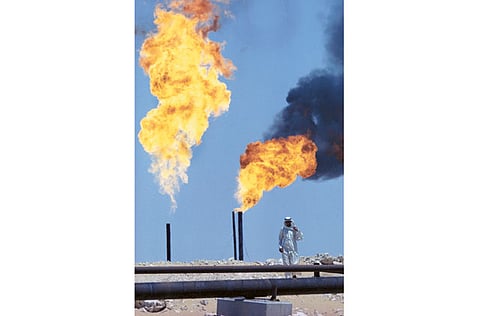In the Pipeline: It's been a good start for oil in January
the momentum in the second half of 2010 has carried oil prices to new highs in January this year

Considering oil price movements in the second half of 2010, it is not surprising that the momentum has carried oil prices to new highs in January this year.
The price of brent, the now preferred marker crude, may have approached $100 (Dh367.24) a barrel and its average for January may be close to $97 a barrel as compared to $92.19 last December.
Similarly, Opec's basket of crudes price started the year at $88.99 a barrel and approached $95 more than once. The average for the month may be close to $93 a barrel compared to $88.56 a barrel in December and $72.51 a barrel in July 2010.
Such robust prices were influenced by economic growth and oil demand growth in Asia and the Middle East and a better than expected oil demand growth in the industrial countries due to economic recovery.
The International Energy Agency (IEA) kept raising its demand forecast month after month and in its January report, the raise is a hefty 320,000 barrels a day (bpd) on 2010 demand and 2011 forecast. Economic growth prospects and cold weather may have prompted these revisions.
World oil demand according to IEA is now expected to grow from 87.7 mbd in 2010 to 89.1 in 2011.
Opec forecast however, is lagging and growth is expected from 86.1 mbd in 2010 to 87.3 in 2011 and it is difficult to explain such divergence by different methodologies or by Opec conservative attitude especially given the two organisations are close in forecasting the call on Opec crude which was 29 mbd in 2010 and is now expected to be 29.4 mbd in 2011.
Speculation
Prices were also influenced by a weaker dollar and increased speculative activity in the futures market in addition to the temporary closure of the Alaska pipeline for repairs.
The risks associated with political development, the latest of which is the uprising in Egypt, pushed prices further towards the end of the month.
The price movement has raised the pressure on Opec to call an emergency meeting to increase supply. But Opec has successfully fended the pressure and barring a significant and sudden rise in oil prices, the organisation is unlikely to meet before its next scheduled meeting in June.
Opec has increased its production ceiling in a de facto manner because its production in December is estimated at 27.15 mbd (excluding Iraq) compared to a ceiling of 24.8 mbd and compliance is barely 45 per cent now.
Opec may tolerate further erosion in compliance if oil prices go higher without officially sanctioning such new increase in production.
The expected increase in 2011 in Iraq's production, which is outside the production level agreement, must be also taken into account if the organisation is to avoid a slide in prices.
Some Opec ministers tried to calm the market while not committing to a specific action.
Mohammad Bin Dha'en Al Hamili, the UAE minister of energy, said: "There is no shortage of oil, the market is well supplied. We're monitoring the market very closely". The Saudi oil Minister Ali Al Naimi said: "Opec's policy, as is well known, is to meet any increase in oil demand to maintain the supply-demand balance".
He added "the market this year will be in total equilibrium" and "I expect stability to continue at last years' rates".
Further gains
While analysts expect further gains in oil prices in 2011, many see a repeat of the high prices of the first half of 2008 unlikely.
The situation is different and many bottlenecks that drove prices in 2008 are now resolved. Stocks of crude and products are in a very comfortable position, shortages of quality refining capacity is no longer the case, surplus production capacity in Opec countries is close to five to six million barrels a day, demand is growing at less than previous rates and fuel subsidies have reduced in many countries.
Finally, it has become clear that the US marker crude West Texas Intermediate (WTI) is no longer responding to the state of the market.
Historically its differential with brent crude was generally positive and close to $1 a barrel. Currently WTI price is lagging Brent's by over $10 a barrel sometimes due to rising stocks of the crude at Cushing, Oklahoma the settling point for WTI price. An executive at Valero Energy Corp said WTI had "almost become irrelevant" because of its deep discount" to Brent.
In a short time Brent crude volume will go down and it may suffer from the same symptoms of WTI now. It's about time that OPEC crude such as Arab light becomes the international marker.
The writer is former head of Energy Studies Department in OPEC Secretariat in Vienna



